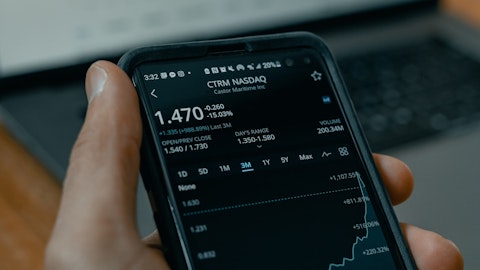2. Shell plc (NYSE:SHEL)
Number of Hedge Fund Holders: 39
Shell plc (NYSE:SHEL) is a London-based energy and petrochemical company operating in Europe, Asia, Oceania, Africa, the United States, and the rest of the Americas. The company’s Renewables and Energy Solutions segment generates electricity through wind and solar resources. The company also produces and sells hydrogen, offers electric vehicle charging services, as well as energy storage. Shell plc (NYSE:SHEL) posted a Q2 GAAP EPS of $4.80 and a revenue of $100 billion, outperforming market estimates by $1.69 and $17.76 billion, respectively.
Investment advisory Berenberg on August 1 maintained a Buy recommendation on Shell plc (NYSE:SHEL) but lowered the price target on the shares to EUR 31.50 from EUR 33.
Among the hedge funds tracked by Insider Monkey, 39 funds reported long positions in Shell plc (NYSE:SHEL) at the end of the second quarter of 2022, compared to 37 funds in the last quarter. Ken Fisher’s Fisher Asset Management is the leading position holder in the company, with 20.25 million shares worth $1.06 billion.
Here is what Harding Loevner International Equity Fund has to say about Shell plc (NYSE:SHEL) in its Q1 2022 investor letter:
“While risks of unforeseen consequences arising from the Ukraine conflict are high, on this front we are cautiously optimistic that China will work hard to maintain its neutrality in a credible way, as it is a huge beneficiary of trade with the rest of the world, especially the rich developed nations. We think it likely that China, along with India, will continue to buy oil and gas from Russia (just as Europe, at least for now, plans to keep its gas pipelines open), and do not expect that fact to alter China’s trade relations with the West much. Nevertheless, we must contemplate that our optimism is misplaced on the importance of membership in the global network of exchange. If our central and optimistic case—admittedly an educated guess—is wrong, then we’d need to greatly modify our views of which companies in our opportunity set will face new barriers to profitable growth, and which might stand to benefit, relatively, from a further receding of globalization. (Global trade, after all, has never matched the peak share of GDP it reached in 2008, before the Global Financial Crisis.) We’d expect such a world to be less efficient, as the cold logic of comparative advantage is demoted as a determinant of which goods or services are produced and where. That would lead to a less prosperous world, since exploiting comparative advantage is a cornerstone of wealth creation. If regional blocs began to raise limits on the movement of capital as well as goods, we’d need to parse which of our multinational companies were at risk of declining sales from increasingly hostile, siloed countries. Royal Dutch Shell (NYSE:SHEL) has found its Siberian oil and gas joint venture assets stranded by the combination of sanctions and the public opprobrium of Russia’s actions.”





